Time.
What is it?
Other than a mite.
Gorging itself on the present.
A parasitic itch.
Which no pyrethrin’s can treat.
An unwelcome guest.
Like overly loose effluence.
That trickles, and gushes.
Pooling together.
Before swirling further.
In a sacred circle dance.
Shakespeare urged its refrain.
Herrick gathered its rosebuds.
Dickinson tried to halt the pendulum.
And Hardy gave it his heart.
But what is it?
This thing we call time...
That flows like a river.
And yet, it stands still.
Is said to have order.
Is believed to be real.
It measures a day.
And counts down a life.
With never enough to go round.
Because the universal privilege is now...
We spend it, we waste it.
We chart it, and lose it.
Newton thought it absolute.
But Einstein denied it.
And Barbour tried to destroy it.
Flawed relative arguments.
They tried to tame it.
Even the illusionist’s.
They couldn't name it.
This thing we call time...
Is it reality?
Is it irreducible?
Is it fundamental?
Or ultimately non-temporal?
This time...
Our past, and our future?
Our coming, now going.
Neither of which matter.
Since time immemorial.
Present is the only real moment.
That moment of becoming.
That smooth, continuous now.
Now is that time...
Some time has past since the last of these soliloquies, and from the very beginning of March, I have naught but shared the works of others.
And so, when the time finally came once more, to put pen to paper (or at least our modern equivalent of such, as this 21st century seems to have no more need, nor use, for the fountain pen), I was struck by writers block…
My fellow man had already shared my own inner works, and unlike those journalists, who can turn blood into ink at the drop of a hat, I require that blood to flow through me, pump hard in order to transform it into ink, for the words to be received, ushered, and then cajoled, never forced.
And so, I have spent (what now feels like an inordinate amount of time), simply enjoying the words of others, as they speak my own heart and mind.
But with each passing week, the desire and need to write did not subside, unlike the dreaded writers block…
And thus, when I sat down to compose what you read here today, I eventually settled on the topic of ‘Time’.
We perpetually rail against it, at least, when we're not chasing it.
But do we actually understand it, do we truly know it?
Or are we squandering it?
Living it, without true experience of it?
It is a man-made construct, that was devised in order to control and monitor industry, and individual production.
And now, it controls Man completely.
But do not tell the scientists this, as they will claim it is a lie…
Do not inform the historians or archaeologists, as time is all they truly have, the rest is just their fertile imagination.
All they think they know…
Astronomers, and even Astrologers, will regale you with facts about the revolution of Earth around the Sun, of the Moon and the seasons, and how time can be broken down.
But this is a peculiarity of the Western mind…
In the lectures* given by Rudolf Steiner, shortly after his visit to (what was then) Great Britain in August 1923, he commented:
Western world-views are concerned with Man’s place in the whole course of history on Earth, whereas those of the East are content to envisage Man in terms of ‘space’ only. The essential nature of Man can be seen in the evolution of his consciousness. Man experiences his own being in waking, dreaming and sleeping. In modern thinking he loses his real self. Descartes’ ‘cogito ergo sum’ is not based on something inwardly experienced but is only a convulsive effort to attach oneself to reality.
*Transcribed from “Man in The Past, The Present and the Future (The Evolution of Consciousness)” lectures given in Stuttgart over the 14th, 15th, and 16th September, 1923. Originally translated by E. Goddard, and published by Rudolf Steiner Press in 1966 (emphasis mine).
This got me thinking.
‘Time’ and ‘Space’.
Space or Time…
West or East?
Maybe, to better understand ‘Time’, I needed to return East.
To the wisdom of Tibetan Buddhism, back to the Taoist’s way of thinking, and to Rumi.
In essence, to dispel my western tainted thoughts and (re)embrace that which first opened my mind so very long, long ago.
And thus I offer what follows…
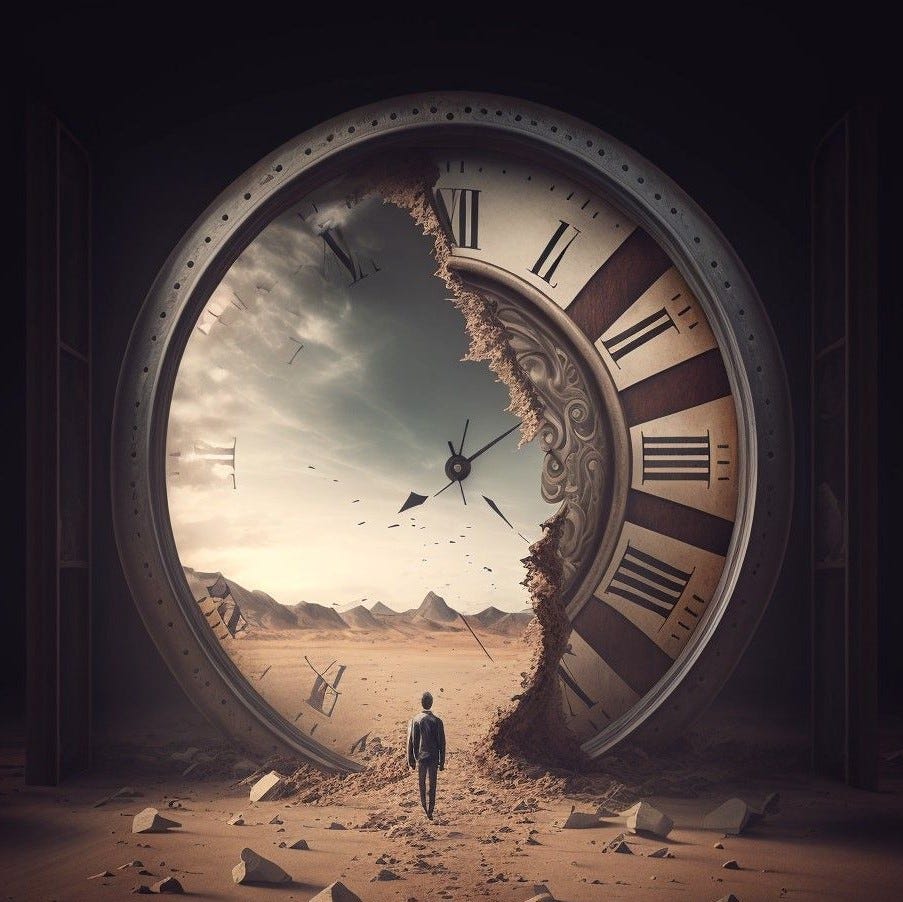
Despite lamenting my lack of words, and the sharing of others work; a path well trodden is always a handy guide of the route to take…
And so, these words below have been painstakingly collected, like a fresh abundant harvest, from the works of those that have known Shambhala.
(I have provided title and author for each, so that any who wish to pursue their words further, have a signpost with which to start their journey).
The River - Rumi (Mathnawi III, 4300-04)
Time is limited; the abundant water is flowing away.
Drink, before you fall to pieces.
There is a famous conduit, full of the Water of Life:
draw the Water, so that you may become fruitful.
We are drinking the water of Khidr
from the river of the speech of the saints:
Come, thirsty one!
Even if you don’t see the water,
as skillfully as a blind person,
bring the jug to the river and dip it in.
*Khidr is the immortal ‘Green Man’ who appears as a guide to those who are worthy.
Our World is Relentlessly Impermanent - Chagdud Tulku Rimpoche
Change is continuous. Day by day, one season slips into the next. Day turns into night and night to day. Buildings don’t suddenly grow old; rather, second by second, from the moment they’re constructed, they begin to deteriorate… Think of beings inhabiting this universe. How many people born a hundred years ago are still alive?… We see the play of impermanence in our relationships as well. How many of our family members, friends, people in our hometown, have died? How many have moved away, disappearing from our lives forever?… At one time we felt happy just being near a person we loved. Just to hold that person’s hand made us feel wonderful. Now maybe we can’t stand him, we don’t want to know anything about him. Whatever comes together must fall apart, whatever once fathered must separate, whatever was born must die. Continual change, relentless change, is constant in our world.
Misperceiving the Ordinary World as Solid - Dilgo Khyentse Rimpoche
If we look at the nature of worldly views and activities, we find that they are caused by a lack of proper investigation. We operate under the illusion that the relative truth is something solid and truly existent, but this is the definition of delusion. If we look carefully, we find that the world is like a rainbow: vivid and colourful, but without any solid existence.
When a magician creates the illusion of horses, oxen, chariots, and so forth, although they (appear and) can move, they are actually nonexistent. In the same way, a person who has realised the emptiness of all phenomena recognises the activities of the world as an illusion. Nowadays, this is a very difficult thing to do - delusion is heaped on delusion and it spreads like monkeys imitating each other. We are so deceived that it is hard to find a way out. Having lost sight of the true nature of things, it is easy to waste one’s life.
A Dayfly - Lu Yen (also called Lu Tung-pin, Lu Dongbin, Lu Tsu, or simply ‘Ancestor Lu’)
Human life in the world is no more than that of a day-fly. This is true not only of ordinary people but also of the wizards and buddhas of all times as well. However, though a lifetime is limited, the spirit is unlimited. If we look on the universe from the point of view of our lifetime, our lifetimes are those of dayflies. But if we look on the universe from the point of view of our spirit, the universe too is like a dayfly.
Make the Most of This Life - Dzigar Kongtrul Rinpoche
If we do not know how to turn our own suffering into favourable circumstances for our own awakening, if we cannot cultivate the depth of our own intelligence, if we cannot change our condition of being an ignorant person to an awakened one, who can do it for us? If this is not done in this life, never in millions of aeons will it be different. Especially if you cast away your precious human life in just doing unimportant business that doesn’t concern your long-term well-being. Just getting a roof over your head, just feeding your children, just having some means to love - all human beings require those. Even animals require those things. But beyond that, if you hold on to some very self-important image of yourself as a lawyer or doctor or businessman or whatever - in the end it won’t be me who is speaking to you; it will be you yourself feeling a tremendous loss of this precious human life. You cannot immediately change so drastically and become ‘Milarepa’. But you could change day to day, minute to minute in the time you have.
*Milarepa represents the quest for purification and Buddhahood during a single lifetime, tracing the path of a great sinner who became a great saint.
How have you Spent your Life? - Rumi (Mathnawi III, 2149-53)
On Resurrection Day God will ask,
“During this reprieve I gave you,
what have you produced for Me?
Through what work have you reached your life’s end?
For what end have your food
and your strength been consumed?
Where have you dimmed the luster of your eye?
Where have you dissipated your five senses?
You have spent seeing, hearing, intelligence
and the pure celestial substances;
what have you purchased from the Earth?
I gave you hands and feet as spade and mattock
for tilling the soil of good works;
when did they by themselves become existent?”
Freedom - Thich Nhat Hanh
Every one of us has the tendency to run. We have run all our lives, and we continue to run into the future where we think that some happiness may be waiting. We have received the habit of running from our parents and ancestors. When we learn to recognise our habit of running, we can use mindful breathing, and simply smile at this habit and say, “Hello, my dear old friend, I know you are there.” And then you are free from this habit energy. You don’t have to fight it. There is no fighting in this practice. There is only recognition and awareness of what is going on. When the habit energy of running manifests itself, you just smile and come back to your mindful breathing. Then you are free from it, and you continue to breathe in, breathe out, and enjoy the present moment.
Walk Slowly - Lu Yen
Walk slowly, at a relaxed pace, and you won’t stumble. Sleep soundly and you won’t fret through the night. Practitioners first of all need serenity and patience. Second, they need dispassion, not to think about the past or be concerned about the future. If you think about the past, your former self will not die. If you think about the future, the road seems long and hard to traverse. It is better to be serene and relaxed, not thinking of past or future but just paying attention to the present, acting normally. Each accomplishment is an achievement, and this will build up. If you are eager for completion and vow to do so many deeds or practices, this is still personal interest, calculating merit and striving for gain. Then the mind cannot be pure. This is the root of inconsistency.
The Way of Heaven and Earth - Huai-Nan-Tzu
Human nature is generally such that it likes tranquility and dislikes anxiety; it likes leisure and dislikes toil. When the mind is always desireless, this can be called tranquility; when the body is always unoccupied, this can be called leisure.
If you set your mind free in tranquility and relinquish your body in leisure, thereby to await the direction of nature, spontaneously happy within and free from hurry without, even the magnitude of the universe cannot change you at all; even should the sun and moon be eclipsed, that does not dampen your will. Then you are as if noble even if lowly, and you are as if rich even if poor.
The Water of the Water - Rumi (Mathnawi III, 1271-74)
Day and night there is movement of foam on the Sea.
You see the foam, but not the Sea. Amazing!
We are dashing against each other like boats:
our eyes are darkened though we’re in clear water.
O you who’ve gone to sleep in the body’s boat,
you’ve seen the water,
but look at the Water of the water.
The water has a Water that is driving it;
the spirit has a Spirit that is calling it.
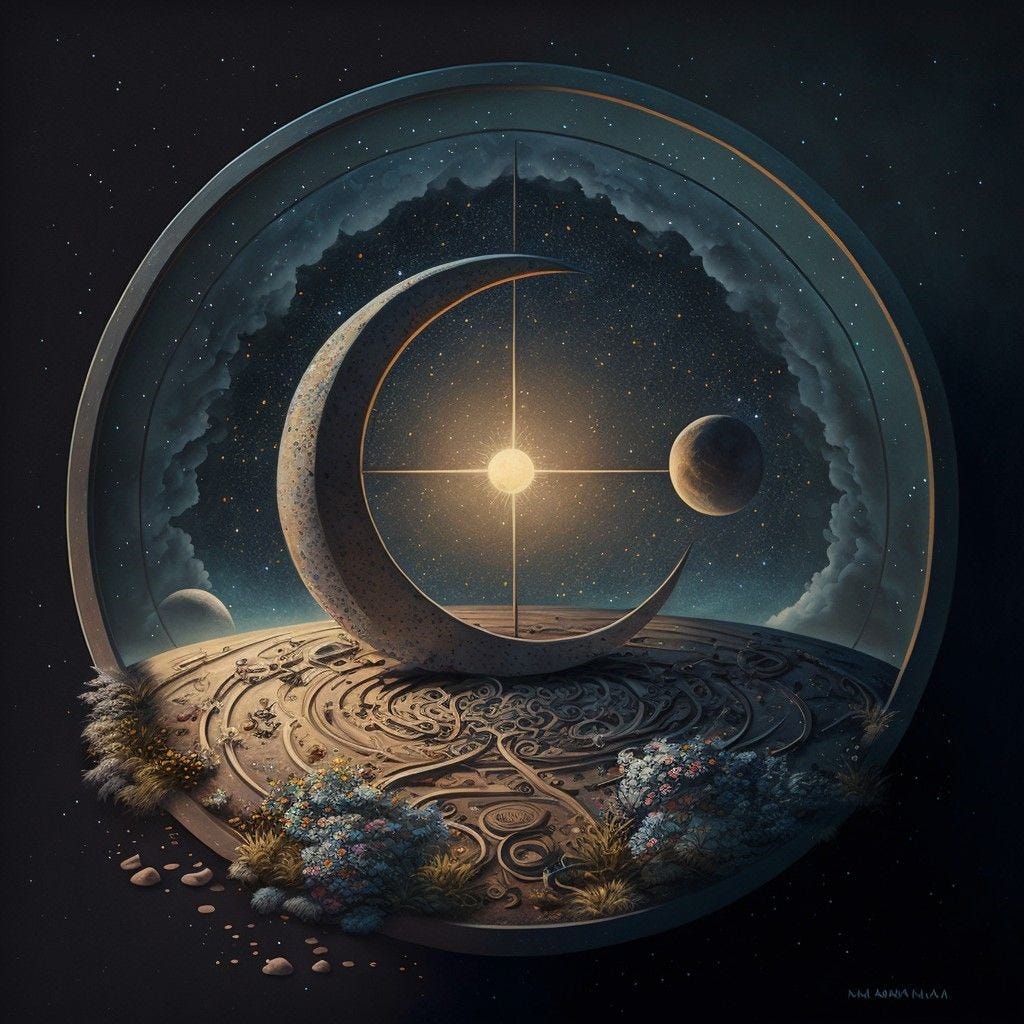
Let me conclude today’s collection of ‘words’, both my own, and those of others, with some more, by the prodigious poet Johann Wolfgang von Goethe.
Here is his poem “In Living As In Knowing” (translated by Michael Hamburger, which appeared within ‘Great Writings of Goethe’, edited by Stephen Spender, and published by The New American Library, 1958):
In living as in knowing, be
Intent upon the purest way;
When gale and current push you, pull you,
Yet they’ll never overrule you;
Compass and pole-star, chronometer
And sun and moon you’ll read the better,
With quiet joy, in your own fashion
Will reach the proper destination.
Especially if you don’t despair
Because the course is circular:
A circumnavigator, hail
The harbor whence you first set sail.

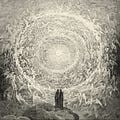





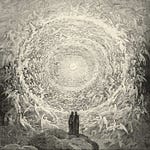
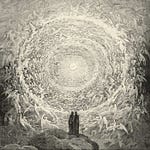
Seraphim's Soliloquies Episode Three (Time)